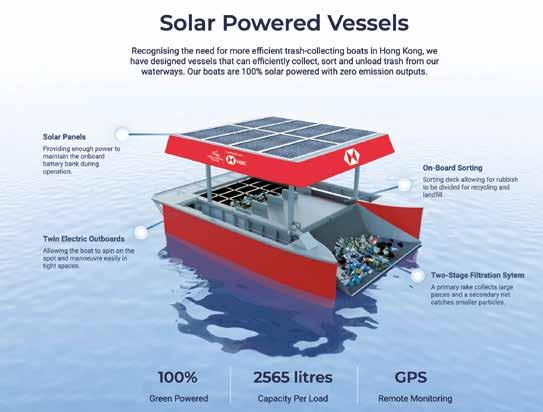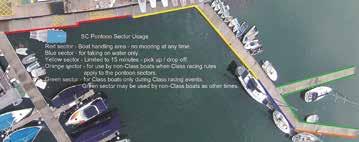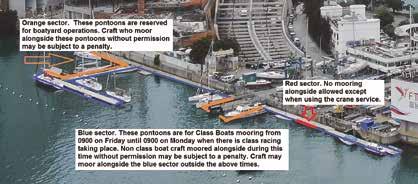
5 minute read
Pick Up Plastic : Solar Powered Pick-up
from Ahoy! March 2021
by Koko Mueller
WORDS: IAN BROWNLEE, CHAIR SUSTAINABLE WORKING GROUP
You may have seen two unusual looking vessels in the Causeway Bay Typhoon Shelter cruising around and picking up plastic waste. These are operated by the Clean Waterways Initiative a non-profit organisation which was started by Ellen Ogren and Angus Harris in 2019.
Advertisement
Clean Waterways Initiative has a mission to clean up Hong Kong’s heavily polluted waterways and raise awareness of the need to fight plastic pollution. They have a fleet of four purpose – designed solar powered vessels and their main goal is to prevent rubbish and plastic debris from making its way from the densely populated waterways of Hong Kong into the open ocean where it will have a harmful effect on the marine ecosystems. Aberdeen Harbour and Victoria Harbour are two of the most polluted waterways in Hong Kong and they have two vessels operating in each harbour.
The vessels are 6.5m long and 5.5m wide and have a top speed of around 5 knots. There is a scoop in the front which collects the larger pieces of waste with a net which collects the smaller pieces of plastic and brings them out of the water. The twin outboard motors are powered by 8 solar panels on the roof. The vessel is designed with space for manual sorting of the waste into material suitable for re-cycling and material which goes to landfill. The development and operation of the boats are part of a partnership with the HSBC Clean Waterways Programme, which includes a series of community education and volunteer programs to help address and raise awareness of the plastic waste issue.
The objectives of the Clean Waterways Initiative align closely with the Clubs program of “Picking Up Plastic”. Our target is for water sports people to be aware of the need to remove plastic from the water and to provide the means for doing it.
The SWG have identified with Clean Waterways Initiative how the Club could support their activities which fully align with the Clubs sustainability objectives. General Committee has endorsed a 5 year agreement for the Club to provide technical assistance and support. For example, there may be periods of limited sun when the solar power is not adequate to power the vessels. The Club has agreed to provide free of charge an electrical supply to the pontoon at Kellett Island. So you may see the vessels moored alongside, especially overnight, or in times when the pontoons are only lightly used.
The support of the Club will be acknowledged by Clean Waterways Initiative, while they will also provide advice to the Club regarding the future introduction of solar powered vessels. The Club will collaborate with Clean Waterways on programs of outreach, education and communication.

To advise members on the use of the pontoons and marina berths at the Club facilities, the Club website has some diagrams under the Use of Pontoons section.
The Clubs pontoons at Kellett Island, Shelter Cove and Middle Island are primarily for the use of Class Racing boat during the weekends.
The Marina at Shelter Cove if for the use of berth holders only and no other members should use the marina pontoons without permission of the Marine Office, or the Shelter Cove Marine Supervisor. All the berths on the marina are allocated and the members are paying a monthly rental fee on these berths. Please do not “park” in another members space.
The day pontoons at Shelter Cove are divided into different coloured sectors as shown below. The green sector is solely for the use of Class Boats from 0900 the day prior to Class racing until 0900 the days after Class Racing has finished. Members are asked to refrain from using the green sector at these times.

The orange sector may be used by non class boats when the Class Boat rules are in force. Members should be prepared to berth alongside another craft when the sector is full, remembering to tie up with spring lines, fore and aft lines and keeping masts away from each other.
The pontoons at Kellett Island is the busiest of all the Clubs pontoons. On normal Class racing days there are an average of 50 Class Boats moored alongside the pontoon.
The Blue area is specifically allocated for Class boats to moor alongside.
At the Around The Island Race and other regattas this number increases dramatically and all the pontoons are required for the Class boats to use. At these times the boatyard orange area is also given over to Class Boats . The pontoons at Middle Island are primarily used by Class Boats, Committee Boats, Club Dinghies and RIBs’
The pontoons are, by necessity, due to the sea conditions during typhoons, manufactured from UDM Rotomoulded plastic. This gives them a lot more flexibility in the swell conditions experienced in Deep Water Bay during typhoon conditions. These pontoons are also reserved for Class Boats prior to racing. Being plastic they are not so strong as the concrete pontoons, that are fitted at Shelter Cove and Kellett Island, and therefore they are not suitable for craft over 30 feet in length to moor alongside. The reason for this is the size and strength of the cleats on the pontoon.
Members with larger craft than 30 feet in length are allowed to drop off or pick up passengers alongside the Middle Island pontoons but are not allowed to moor alongside. Member who wish to uplift water at Middle Island should moor beside the crane area only and secure their mooring ropes to the sea wall for the short period they are alongside.
At Shelter Cove presently there is a limit to the length of time a craft may lie alongside the pontoon of 36 hours in a week. After this time the boat owner will be charged for spending time alongside, unless permission has been granted by the Marine Office or the Marine Supervisor. In the revised edition of the bye-laws, that will be enacted later this year, there will be a time limit for craft to spend alongside the Club’s pontoons. Regretfully this has had to be introduced as there are some members craft spending time alongside “hogging the pontoon” when other members are unable to access the pontoon.
Happy boating.













